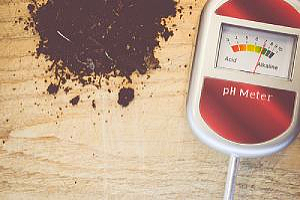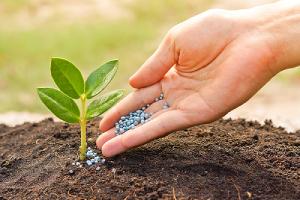 Homeowners can benefit by understanding the pH of the soil in their lawn and garden. This determines how well plants, shrubs, fruits, vegetables, trees, and other types of vegetation grow. It can also play a role in the number of weeds your lawn has.
Homeowners can benefit by understanding the pH of the soil in their lawn and garden. This determines how well plants, shrubs, fruits, vegetables, trees, and other types of vegetation grow. It can also play a role in the number of weeds your lawn has.
A common mistake many homeowners make is thinking acidic soil is always a good thing. Typically, acidic soil is better than alkaline soil; however, there is a point at which the acidity of soil may cause problems with your lawn and garden.
Learning more about what soil acidity means, what the ideal pH level of the soil is and how soil acidity can affect plants is helpful in determining what plants you should grow and whether you should take action to improve your soil pH.
What Soil Acidity Means
Soil acidity refers to the concentration of hydrogen ions in the soil. The acidity of the soil can affect how well certain plants grow — some plants prefer acidic soil whereas others might tolerate alkaline soil better. This is because the pH level of soil can either allow plant roots to have more access to water and nutrients or restrict its access to the essential nutrients.
Soil is measured in pH units on a scale of 1 to 14. The lower the pH level, the more acidic the soil is, whereas higher scores represent soil that is more alkaline. A score of around 7 is considered neutral. Understanding your soil acidity can help you determine the best plants to grow and the best action to take if your soil is either too acidic or too alkaline.
Effects of Soil Acidity on Plant Nutrition
Soil acidity can affect the solubility of plant nutrients. This means soil that is too acidic or too alkaline may make it more challenging for plants to receive the nutrients they desire.
Soil that is too acidic may also cause aluminum toxicity. This occurs when low pH soil makes aluminum soluble. When this occurs, the access the plant root has to essential nutrients and water may become compromised. This can lead to a lack of optimal plant growth and may cause some plants to die.
Another concern is that certain plant nutrients may not be available in highly acidic soil, regardless of whether or not adequate fertilizer is applied. Essential nutrients that often are not available in highly acidic soil include:
- Calcium
- Nitrogen
- Sulfur
- Manganese
- Phosphorous
- Potassium
On the other hand, soil that has an ideal pH level of between 6 and 7.5 ensures the root receives the water and nutrients it needs without causing aluminum toxicity.
Plants That Need Acidic Soil
 There are many plants that require acidic soil to grow properly. If the soil is alkaline, the plants may never make it or may not bloom the way you expect. There are several dozen or more plants that need acidic soil to grow at their best. Some of the more common ones include:
There are many plants that require acidic soil to grow properly. If the soil is alkaline, the plants may never make it or may not bloom the way you expect. There are several dozen or more plants that need acidic soil to grow at their best. Some of the more common ones include:
- Colorado Blue Spruce
- Bleeding Hearts
- Bunchberry
- Dogwood plants
- Azalea
- Hydrangea
- Magnolia trees
- Bottlebrush shrubs
It is important to check the recommended pH level of the soil you desire and try and stay consistent with the ones you choose. In other words, do not place plants that need acidic soil next to plants that require alkaline soil. There are things you can do to lower the pH of the soil to make it more acidic if necessary, such as adding sulfur, acid fertilizer, or peat moss.
Plants That Need Alkaline Soil
If you have alkaline soil, the good news is there are plants that you can still grow while you work towards lowering the pH of your soil. Although there are few (if any) plants that actually “need” alkaline soil, there are many plants that tolerate alkaline soil well. Examples include:
- Forsythia
- Lilac
- Yuki Cherry Blossom
- Clematis
- Boston ivy
- Maidenhair
- Daisy
Many of the flowers that grow well in alkaline are beautiful and great alternatives for those who have alkaline soil. In addition, there are various trees, shrubs, fruits, and vegetables that do well in alkaline soil.
After you determine the soil pH level of your lawn and garden, you can then choose the most appropriate plants, fruits, vegetables, shrubs, and trees to plant, or you can take action to lower your pH to make the soil more acidic.
Determining Soil pH
 Before you choose the plants you want in your lawn and garden, you should first determine whether your soil is acidic, neutral, or alkaline. There are several accurate ways to determine the acidity of your soil, which include:
Before you choose the plants you want in your lawn and garden, you should first determine whether your soil is acidic, neutral, or alkaline. There are several accurate ways to determine the acidity of your soil, which include:
- Professional testing – The most accurate way to determine the pH level of your soil is to send it to a local cooperative extension office. They can test the pH level (among other things) and send a detailed report back to you.
- At-home soil pH test – If you are looking to save some money while still getting a fairly reliable idea of the pH of the soil, you can order an at-home, DIY soil pH test. They are fairly accurate, although they may not offer results as detailed as professional testing does.
- Vinegar pH test – A far less reliable method of testing the pH of the soil is the vinegar pH test, which is free and — for the most part — safe. The idea is to simply pour a small amount of vinegar into the soil and check for fizz. If there is no fizz, the soil is likely more acidic; if there is fizz, the soil is probably more alkaline.
- Check the weeds in your lawn – There are certain weeds such as plantain, dandelion, buttercup, and horsetail that grow well in acidic soil. If they exist in your lawn, then you likely have acidic soil.
After you determine your soil acidity, there are actions you can take to lower your soil pH, if necessary, such as adding sulfur, peat moss, or acid fertilizer.
Contact the Soil Experts
To learn more about soil acidity, give the experts at Dirt Connections a call today. Here at Dirt Connections, we are glad to answer your questions and help you with your gardening, project and any top soil needs. Call us to get help with your latest project. You can reach us by phone at 703-940-9949 to speak to our experts today!
Summary

Dirt Connections was started with one goal in mind: providing quality residential and commercial construction services to clients on time and on budget. Reach out for more information on how we can support your next project.
For your convenience our estimates are free and by appointment. Call 703-940-9949 for a free estimate today!



